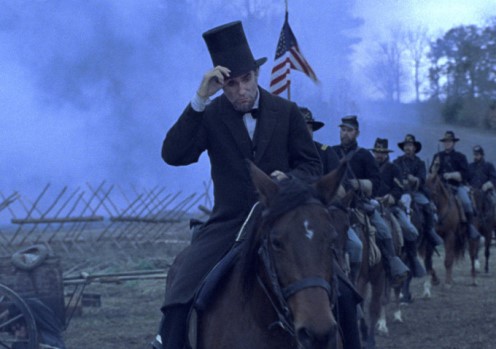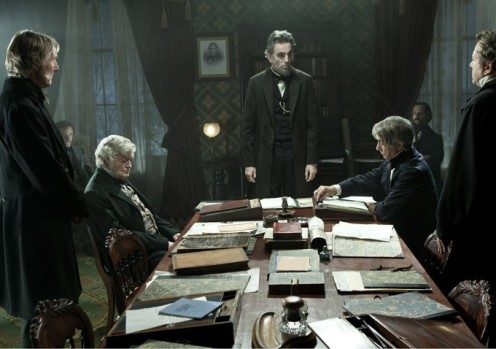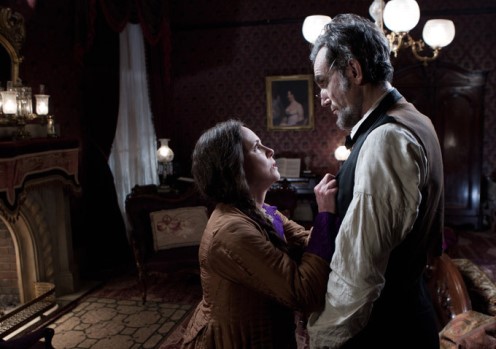Lincoln
"Compromise or you risk it all". The warning isn’t directed to Daniel Day-Lewis’s splendid Abraham Lincoln, but it’s a succinct summary of the film’s message. Lincoln isn’t a life-story biopic: we get none of Lincoln’s prairie-lawyer days or his rise to power. Instead, the film focuses on the events of January 1865, and Lincoln’s historic bid to amend the U.S. Constitution by passing the Thirteenth Amendment to abolish slavery.
How the Rest was Won

© Twentieth Century Fox, 2013. Used by permission.
The Lincoln we see, for all his folksy, home-spun charm, is a steely-eyed and accomplished political animal. He is quite prepared to be all things to all men to achieve his goals, and to make full use of the powers of patronage available to him in order to buy the votes of wavering Congressmen.

© Twentieth Century Fox, 2013. Used by permission.
Through the years, perhaps more than most politicians, Lincoln has been claimed by a wide range of political perspectives. For modern Republicans he’s a hero of the Union, holding it together in its hour of greatest need; for modern Democrats he’s the man who ended slavery, a liberal hero of human rights. Spielberg’s film isn’t afraid to reveal that there’s no simple, clear answer to the question of where Lincoln would belong in a modern context.
Abraham Lincoln has to juggle three interlinked priorities: the passing of an amendment to abolish slavery once and for all, the ending of the civil war and – perhaps his greatest concern – the preservation of the Union. The problem is, these goals work against each other. Popular opinion is that ending slavery is a good thing because it would end the war, but if war can be ended by other means it’s better not to free the slaves. Conversely, Lincoln believes that if he ends the war without striking the decisive blow against slavery, he risks the unravelling of peace and another secession to divide the United States.

© Twentieth Century Fox, 2013. Used by permission.
Mary Lincoln (Sally Field), Abraham’s long-suffering wife, urges her husband not to spend his political capital on what she sees as a doomed attempt to end slavery. Thaddeus Stevens (a magnificently bewigged Tommy Lee Jones), the poster boy of the radical abolitionist movement in Congress, is warned not to reveal just how equal he wants blacks to be, for fear of scaring moderates into the pro-slavery camp. When he bites his tongue and resists the opposition’s taunts, he is chastised by old friends and colleagues.
Stevens himself sums up the Thirteenth Amendment as, "The greatest measure of the nineteenth century, passed by corruption, aided and abetted by the purest man in America." The complexity of that statement is a reflection of the film’s strength. This is a grown-up analysis of morality and the mechanics of politics. If it seems at times like an extra-long episode of The West Wing, some would say that’s no bad thing.

© Twentieth Century Fox, 2013. Used by permission.
It’s easy to take lofty moral positions on the question of compromise, but Spielberg avoids the glib answers and asks if things aren’t sometimes more complicated. When Stevens complains to Lincoln that America’s white population have seen their moral compasses ossified by the benefits of slavery, Lincoln retorts that a compass is only good for telling you which direction is true North – it can’t tell you how to find your way around the swamps and crevasses you might find as you travel by it. His own moral compass tells him where he needs to lead the nation, but the route is by no means a straightforward one.
The film shows Lincoln both as an honourable, decent man, and also one who is willing to resort to bribery, patronage and deception in pursuit of his political goals. He describes America as "an idea for democracy to aspire to, eventually to be worthy of" and he seems willing to commit unworthy acts in order for that aspiration to, one day, be realised. And, of course, there’s the matter of a Civil War that cost more than a million lives. At one point, Lincoln comments to General Ulysses S. Grant that, "We’ve made it possible for one another to do terrible things."
There’s an almost Shakespearean question of divinely-ordained justice left hanging throughout the film. One sub-plot concerns Lincoln’s grown-up son Robert (Joseph Gordon-Levitt) fighting his parents to be allowed to join the army and play his part in the Civil War. Abraham is caught in the middle as Mary – who has already buried one son – argues that, with so much blood on Abraham’s hands, if Robert fights he is bound to die. It’s hard for the audience to forget her perspective as we witness her emotional reaction to her husband’s assassination at the end of the film.

© Twentieth Century Fox, 2013. Used by permission.
We may baulk at Mary’s superstitious reading of events, but the question of who pays for our misdeeds remains. The film’s portrayal of the Christian faith is mixed. On the one hand, Lincoln’s black maid tells him that God will ensure that the amendment passes. On the other, one of Lincoln’s political opponents argues that, "Congress must never declare equal those whom God created unequal". To modern Christian ears, that argument is breathtakingly offensive, and most would also want to gently challenge Mary’s view of God as a cosmic debt-collector. Far from it, they might point her to a God whose response to an imperfect world is to enter into it and willingly die in the place of wrongdoers.
Lincoln asks questions of how we judge our politicians, and how we judge ourselves. It also calls on us to make mature judgements about how we follow our own moral compasses. Compromise is not necessarily a bad thing, but compromising ourselves can be costly and painful. If there are no easy solutions, perhaps the best we can do is to aspire to something of which we may eventually be worthy.
Film title: Lincoln
Keywords: Compromise, justice, equality, politics, integrity, slavery
Director: Steven Spielberg
Screenplay: Tony Kushner, based on Team of Rivals: The Political Genius of Abraham Lincoln by Doris Kearns Goodwin
Starring: Daniel Day-Lewis, Sally Field, Joseph Gordon-Levitt, Tommy Lee Jones
Distributor: Touchstone Pictures (USA); Twentieth Century Fox (UK)
Cinema Release Date: 16 November 2012 (USA); 25 January 2013 (UK)
Certificate: PG-13 (USA); 12A (UK) Contains infrequent moderate war violence, gore and strong language
© 2013 Steve Couch



